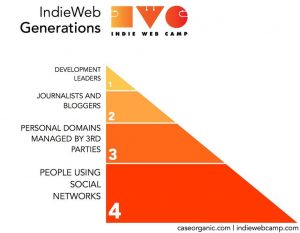Back in January Timo Reitnauer wrote Let’s Make 2017 The Year of the Indie Web. I agree wholehearted with the sentiment of his title and have been personally wanting to do something specific to make it a reality. With the changes I’ve seen in the internet over the past 22 years, and changes specifically in the last year, we certainly need it now more than ever.
In large part, I’ve been inspired by the huge number of diverse and big-hearted developers who are an active part of the growing community, but specifically today I came across a note by Doc Searls, an email about the upcoming NaNoWriMo (National Novel Writing Month), and then a reminder about the 100 Days of IndieWeb project. This confluence of events is clearly my tipping point.
As a result, I’m making my 2018 IndieWeb resolution early. For the month of November, as part of NaNoWriMo, I’m going to endeavor to lovingly craft together a string of about 2,000 words a day on the topic of the IndieWeb to create a book geared toward helping non-developers (ie. Generation 2 and Generation 3 people) more easily own their online identities and content.

Over the past year, surely I’ve read, written about, or interacted with the IndieWeb community concretely in one way or another on at least 70 days. This sprint of 30 days should round out a 100 days project. To be honest, I haven’t necessarily posted about each of these interactions on my own site nor are they necessarily visible changes to my site, so it may not follow the exact requirements of the 100 Days of IndieWeb, but it follows the spirit of the creator idea with the hopes that the publicly visible result is ever more people adopting the principles of the movement for themselves.
I’ll focus the book primarily on how the average person can utilize the wealth of off-the-shelf tools of the WordPress content management system and its community–naturally with mentions of other easy-to-use platforms like Known and Micro.blog sprinkled throughout–to own their own domain, own their content, and better and more freely communicate with others online.
If you haven’t heard about the movement before, I’ll direct you to my article An Introduction to the IndieWeb, portions of which will surely inform the introduction of the book.
If you’ve recently joined the IndieWeb, I’d certainly love to hear your thoughts and stories about how you came to it, why you joined, and what the most troublesome parts have been so I can help direct people through them more easily–at least until there are a plurality of one-click solutions to let everyone IndieWeb-ify themselves online.
As a publisher who realizes the value of starting a PR campaign to support the resultant book, I’m also curious to hear thoughts about potentially launching a crowdfunding campaign to support the modest costs of the book, with profits (if any) going toward supporting the IndieWeb community.
I’m happy to entertain any other thoughts or considerations people have, so feel free to reply in the comments below, or better yet, reply on your own site and send me a webmention.
